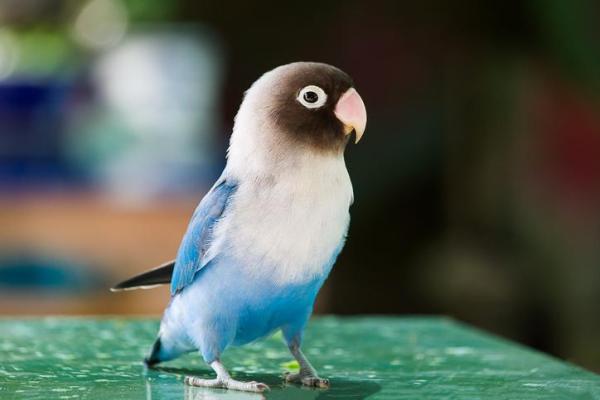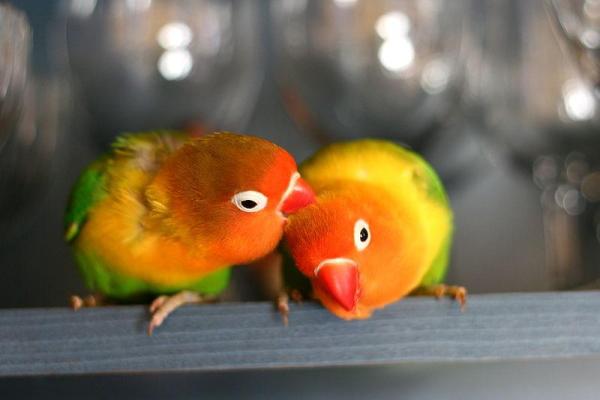Can Lovebirds Live on Their Own?


Lovebirds are a small type of parrot which are known for being particularly affectionate. This happens both with animals of their own species, as well as their human guardians. Not only are they affectionate, but they are known to remain monogamous to the same mate for their entire life. Along with their colorful plumage, cheerful singing and friendly character, they are becoming very popular pets.
For those who are charmed by them, taking the step of adopting a lovebird into your family needs to be made from a place of consideration. We need to inform ourselves of their needs, including how to house them and what to feed them. One important question is can lovebirds live on their own? It's a question AnimalWised answers in this article.
Male vs. female lovebird
Generally, it is very difficult to distinguish between males and females of the lovebird parrot species. Other birds such as the goldfinch are also notoriously difficult to sex. The reason is because these birds exhibit very little sexual dimorphism, i.e. differences between sexes. At best, we can say that females are differentiated by having a slightly larger and wider beak, but sexing them this way is very unreliable. Many professional lovebird breeders have to rely on DNA testing to accurately determine their sex.
However, male and female lovebirds do tend to show behavioral differences. Generally, females tend to be more reserved and have a territorial character. This is due to having to defend the nest they build from predators in their natural habitat. Conversely, males tend to be a little more affable with people. They may not even fight when a third bird is competing for their home.
However, despite the fact that these trends exists, this is not the main guiding principle of lovebird behavior. What really determines whether a lovebird will be sociable and sympathetic to humans is how they have been raised.
Is it better to have one or two lovebirds?
In the wild, the lovebird lives mainly on the African continent. Although they live in flocks, within these larger groups, they form couples which may live together for their entire lives. Contrary to some beliefs, however, is that they are not completely monogamous and may mate with other birds.
As you may have already deduced, social interaction for these birds is paramount. They create bonds with each other which are necessary for their well-being, especially with their mate. Investing time in others has its rewards. They preen each other, scratch each other, share food and more.
Does this mean lovebirds can't live alone? Not necessarily. Although lovebirds will need company, it is possible to meet their social needs. If we create our own bond with the bird, we can give them the care and attention they need. However, in the event where we are unable to spend sufficient time with them throughout the day, then they cannot live separately. If we go to work every day and leave them alone, it can seriously harm the lovebird's health and well-being. In these cases, we should provide them a mate.

You should also consider any potential changes in your own schedule. For example, if personal circumstances mean we can no longer give them the company they require and to which they have become accustomed, they will be affected. Since lovebirds can live an average of 10-15 years, it can be difficult to envision the future. Unfortunately, if you have kept the bird for a long time without a partner, introducing them to a new one is not easy. Since they haven't properly socialized with birds, they may struggle to get alone without disputes.
For this reason, it is recommended you keep lovebirds as a pair. Once you have made this decision, you should know that they do not need to be kept male and female. Lovebirds can create inseparable bonds regardless of their sex. However, we do recommend we always meet when they are young, since it is more complicated to socialize adult birds (as we have previously explained).
Lastly, if you are concerned your lovebird will treat you differently if your human family grows any bigger, then you should have no worries. If raised well, they should maintain their affection forever. They are also likely to enjoy the company of another person. We do need to be careful with any stress new additions can bring such as noise or pets trying to stalk them.
What happens if one lovebird dies?
There is a myth surrounding the keeping of lovebirds in captivity. Said myth claims when one lovebird dies, their mate will die shortly after of grief. This is not entirely true. In reality, when a lovebird in the wild loses their partner, they generally find another in their flock.
When we have a lovebird as a pet, the same situation may not occur. One key difference is the fact that domestic lovebirds do not have a flock. In this case, the lovebird may have less life ahead of them, but not necessarily because of being heartbroken. When a lovebird loses their companion, it means they lack the engagement, activity and reassurance they provided.
Consequently, this can lead to negative effects on the bird's well-being. For example, they may lose their appetite and become listless. In turn, this can lower their immune system and increase the possibility of being affected by disease. We also cannot always rule out the possibility they will have been affected by whatever caused their partner's death.

For how long can a lovebird be alone?
If you have wondered how long your lovebird will survive without a partner or mate, we need to know this will depend on the given circumstances. The individual bird will need to be resilient and able to compensate for the lack of social interaction now the other bird is gone.
Although it is important we still provide our own source of comfort, we should consider getting another lovebird. While it can be very difficult to socialize them, it is not impossible. You will need to be patient and introduce them little by little until they are well enough acquainted.

If you want to read similar articles to Can Lovebirds Live on Their Own?, we recommend you visit our What you need to know category.








